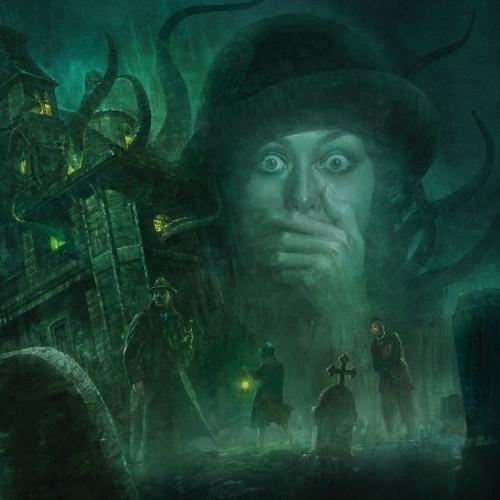Copy Link
Add to Bookmark
Report
Chaosium Digest Volume 17 Number 09

Chaosium Digest Volume 17, Number 9
Date: Sunday, December 22, 1996
Number: 1 of 2
Contents:
Cthulhu Live: A Preview (Robert McLaughlin) CTHULHU LIVE
Investigators and Skill Progression (Ricardo Christe) CALL OF CTHULHU
Editor's Note:
Welcome to the latest issue of the Chaosium Digest. This week, in
V17.9, a preview of Cthulhu Live and an article on skill gain in
CoC. Meanwhile, over in V17.10 you'll find a Dreamlands adventure.
Ricardo J. Mendez (ricardo@tecapro.com) is interested in compiling
some Call of Cthulhu sourcebooks for various countries (ala The Cairo
Sourcebook, and the London Sourcebook, no doubt). If you're interested
in helping out, send him email.
And a Merry Cthulhu to all, and to all a good night.
Shannon
NEW ELECTRONIC RESOURCES:
Once Upon a Time in China
http://www-hsc.usc.edu/~eyin
Updated rules for Eric Yin's Once Upon a Time in Chine campaign, which
first appeared in V5.5 of the Digest are now available on the web.
RECENT BOOKS OF NOTE:
A magazine this week.
* Call of Cthulhu - "Worlds of Fantasy & Horror #4" marks the newest
issue of the magazine that refuses to die. This is the current
incarnation of the Terminus publication that bore the Weird Tales
logo for several years. Lovecraftian enthusiasts will be most
interested in the Dunsany tale in this issue ("A Day on the Bog") as
well as the new (general horror) column by S. T. Joshi. Stories by
Lee, Shipley, Ligotti, Chetwwynd-Hayes, Watson and Schweitzer round
the issue out.
--------------------
From: Robert McLaughlin <100424.2612@CompuServe.COM>
Subject: Cthulhu Live: A Preview
System: Cthulhu Live
CTHULHU LIVE: A PREVIEW
by Robert "Mac" McLaughlin
Early in 1997, Chaosium will publish its live-action role-playing
version of CALL OF CTHULHU. This is the first mass-market attempt to
bring the Lovecraft mythos into a comprehensive and complete LARP
rules system. I believe that old and new gamers alike will find the
CTHULHU LIVE game to be a refreshing approach to LARPS and a faithful
adaption of the CALL OF CTHULHU RPG that we've all enjoyed for so many
years. I'd like to briefly discuss the game, and answer a few
frequently asked questions about the system.
From its inception, CTHULHU LIVE was meant to be a hands-on game,
using a variety of props, costumes, and locations. Players have the
opportunity to handle "ancient relics", page through tomes of
blasphemous secrets, and battle otherworldly horrors. The success or
failure of many actions are determined by the players themselves,
while other special knowledge or skill tests are judged by the
Keeper. Safe game-play is always the primary concern, but I believe
players will be amazed at the excitement and realism generated by a
well-conducted game.
HOW MANY PLAYERS ARE REQUIRED?
A typical game involves a Keeper, four to six investigators, and about
an equal number of NPCs. The numbers vary according to the adventure
and resources of the gaming group. NPC gamers frequently play multiple
roles during the course of a game, although a few "Primary NPCs" have
lead roles which they play for the entire session.
HOW MUCH TIME IS INVOLVED?
Most adventures are played within the course of a single evening,
using as few physical locations as possible. Tips on scene changing
and ways to maximize locations are included in the game rules. Very
long games cause players to become distracted, and numerous, far-flung
locations create logistical problems transporting props and
players. Especially ambitious groups may overcome these challenges to
create adventures played over the course of two or more days.
WHAT ITEMS ARE REQUIRED?
Besides a copy of the rules, a gaming group needs a variety of
costumes and props. A "prop room" will grow over the course of several
games, which makes the job easier. Most props will be used over and
over again, while others are created just for a single adventure. A
modest outlay of funds is required, which should be split among all
the gamers. Scavenging through attics, basements, and flea-markets is
a great way to outfit a group easily and cheaply. Suggestions for
collecting props are found within the rules.
HOW IS THE GAME PLAYED?
In short, players create a set of character attributes before the game
begins. The Keeper maintains a copy of these figures to judge the
outcome of special tests. No dice rolling is involved. The Keeper
typically blends into the background during game play, except when his
decisions are required, or a question arises about the rules. Almost
all interaction in the game is between the investigators and
NPCs. Investigators must use their characters' skills and their own
wits to stay alive and (hopefully) thwart the plans of madmen and
alien horrors.
DON'T NPCs HAVE AN ADVANTAGE OVER THE INVESTIGATORS?
NPCs may have attributes and skills superior to investigators. Even
the weakest creatures in the Lovecraft Mythos are more than a match
for most humans. But, NPCs work for the Keeper! They are not playing
to win, they are playing a role.
Adventures are written out like the script for a loosely constructed
play. Certain events are scheduled to happen at specific times, or
upon the action or inaction of investigators. Each NPC has a profile
of goals and attitudes, and those gamers are expected to play their
roles within this framework. The Keeper may give new instructions to
his NPCs-- if they should press harder or pull back-- since he is the
director of the whole show. Investigators sometimes make monumental
blunders which doom the entire party; but no, NPCs don't take
advantage of their inside knowledge to unfairly counter the other
players.
WHAT IF THE INVESTIGATORS DO SOMETHING UNEXPECTED?
CTHULHU LIVE adventures are interactive, improvisational theater.
Adventure scripts are written to cover the most likely actions of
investigators, but no one can foresee every eventuality. The Keeper
and his staff of NPCs meet several times before the game to discuss
investigator reactions and how they might alter the direction of the
script. NPCs must learn their roles well, and understand their part in
the whole story to convincingly improvise lines and actions. The
unpredictability of the investigators is part of the fun of being an
NPC.
IS COMBAT DANGEROUS?
CTHULHU LIVE uses a non-contact combat system. Weapon props such as
cap-guns, rubber knives, and home-made mock weapons are used in the
game, but no physical contact is allowed for reasons of safety and
game control. When hostile actions are initiated, the Keeper announces
the commencement of combat rounds.
Throughout the duration of the encounter, the Keeper announces the
passage of phases and rounds, similar to traditional role-playing
games. Players announce special actions, move about each round based
on their movement allowance, and "attack" and "defend" using a simple
system based on their ability scores and weapon bonuses. Most combat
resolution is accomplished by the gamers themselves. The Keeper
oversees the conduct of these encounters, making sure that the phases
are conducted in an orderly manner. Combat assumes a dramatic "slow
motion" affect as investigators and their opponents turn and shift
through each combat round. The CTHLUHU LIVE combat system is quite
different to other non-contact LARPS on the market today. It's easy to
learn and uniquely playable.
DO YOU REALLY HAVE CREATURES IN THE GAME?
Not all, but many adventures will feature monsters. With a little
creativity and the right costuming, many monsters from CALL OF CTHULHU
may be replicated in a LARP environment. Obviously the more human-like
creatures such as Ghouls, Deep Ones, Night-Gaunts, etc. are easier to
create with masks and some simple costume pieces. Many large
creatures, however, can be reproduced with great effect.
The wonderful thing is that so many costume parts are reusable in
different combinations. As the prop room expands, the group has a
variety of masks, mottled sheets, foam appendages, and wings to mix
and match as required. Since the Keeper wants his creations to be as
scary as possible, special lighting effects, smoke, and the element of
surprise are often combined to elicit real squeals of terror from the
investigators. A whole chapter of the book is devoted to costuming and
special effects.
CAN YOU ADAPT CALL OF CTHULHU ADVENTURES?
Many CALL OF CTHULHU adventures can be adapted for CTHULHU LIVE. Most
need to be modified so that they use fewer locations and NPCs. Complex
story-lines are split into a number of separate mini-adventures played
over several game sessions. With a little creative adaption by the
Keeper, many RPG adventures can be brought to life.
HOW FLEXIBLE ARE THE RULES?
One of the greatest strengths of CTHULHU LIVE is that the rules are
VERY flexible. Tests modifiers are called by Keepers on the fly,
without the use of complex charts and tables. Even new tests not in
the rules may be easily settled and adjudicated by the Keeper using
the flexible Test Resolution system of the game. Over time, gaming
groups may create new standard skills and tests they feel are
necessary.
Additionally, the CTHULHU LIVE system does not limit itself solely to
the Lovecraft Mythos. The game system includes rules for mediums and
psychic powers, vampires, werewolves, living dead, and even ghosts and
other incorporeal entities. The CTHULHU LIVE game system is designed
to fully support traditional horror and supernatural adventures. Many
groups may even prefer to run a series of action-based,
"monster-bashing" adventures such as hunting vampires or battling an
army of the living dead.
IN CONCLUSION
CTHULHU LIVE is a fun and exciting addition to Chaosium's line of
games. Its "hands-on" play and adaptability will be of interest to
experienced LARP gamers, while the simplicity of the rules are no
obstacle to those new to live-action gaming. It should prove of
interest not only to dedicated CALL OF CTHULHU gamers, but also to
fans of CHILL, KULT, GURPS HORROR, White Wolf's WORLD OF DARKNESS
series, and other supernatural horror RPGs. The release date is
scheduled for March 1997.
--------------------
From: Ricardo Christe <rchomsi@ibm.net>
Subject: Investigators and Skill Progression
System: Call of Cthulhu
Investigators and Skill Progression
Players often ask what happens to those skills that seem never to be
raised, no matter how constantly they're used (typically because
they're not used in a way that might justify skill checks).
Some players have their characters find a teacher or tutor to learn
something specific, such as French or perhaps Babylonian art. In these
cases, with regular study, it's only natural that the relevant skill
or skills progress. But, how do you rule that progress, without
affecting game balance and at the same time maintaining internal logic
and coherence?
The simple system that follows was tested in normal gaming conditions,
and could be used to solve such problems. It is based on notes from my
own campaign, as well as numerous other sources (such as a table found
in the 5th edition Keeper's Screen). Before trying it, check if it
suits the style of your own campaign.
Suppose that a character has a skill currently rated at zero - that
is, he/she knows next to nothing about the subject in question.
Somehow the player chooses to change that, and--assuming it's
something that can be taught--finds a teacher of some sort: the
Investigator then begins regular training. (Note that given enough
money and perhaps a reason, someone will teach anything).
After an initial month of training, have the player roll his
character's Idea. Success grants a beginner's skill of 5% to the
character. At the end of each subsequent month he/she keeps on
studying and practicing, the Investigator receives an automatic skill
check.
If that check is successful, he/she receives ONE additional percentile
to the relevant skill, provided he/she has had at least a couple of
hours of teaching per week, plus a variable number of hours of
practice and/or study per week. This study time will, of course, be
determined by the Keeper according to each individual situation, and
his word is final.
If the skill check is failed, the Investigator gains nothing. If
he/she stops his/her studies, these may be resumed at a later
time. This system ensures that the character evolves gradually, making
the player happy as he witness increase, but not fast or dramatically
enough as to spoil the balance of the game. It can, of course, be used
to improve also skills not currently rated at zero; in fact, about the
only skill it can never be applied to is Cthulhu Mythos. The character
will be lucky if he gets about ten percentiles to a skill during the
course of a whole year of game time. Most characters, in most
campaigns, probably won't live that long anyway.
Copyright (c) 1996 Ricardo Christe
rchomsi@ibm.net
--------------------
The Chaosium Digest is an unofficial electronic 'zine about Chaosium's
Games. In no way should it be considered representative of the views
or beliefs of Chaosium Inc. To submit an article, subscribe or
unsubscribe, mail to: appel@erzo.org. The old digests are archived on
ftp.csua.berkeley.edu in the directory /pub/chaosium, and may be
retrieved via FTP.




















